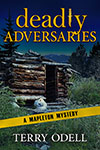It’s Valentine’s Day. Can Mysteries Contain Romance?
Terry Odell

Image by Myriams-Fotos from Pixabay
It’s Valentine’s Day, which probably brings to mind flowers and chocolate, not murder and mayhem. Is there room for romance in a mystery novel? As a writer of romantic suspense as well as mysteries, I say yes, but it’s handled differently.
Note: I’m saying romance, not sex. And it has to belong, not as my high school English teacher said back in the day when banned in Boston guaranteed book sales, “Just open the manuscript, throw in a sex scene, and then get back to what you were writing.”
In a romantic suspense, which falls under the umbrella of the romance genre, things move quickly. Hero and heroine are brought together and must reach their Happily Ever After, or at least the promise of one by the end of the book, all the while dealing with the mystery, suspense, or whatever challenge the author throws at them. I say “promise” of a HEA, because the mystery/suspense/challenge is probably reaching its conclusion in a matter of days. Maybe a week or two, tops. That’s very fast to get to the white picket fence, kids and a dog stage. Not being fond of epilogues, I prefer to go the “promise” route in my books.
In series mysteries, the author has a lot more time to allow characters to develop a relationship. Things can grow slowly. They can change. Partners can split up, one can die, another can show up. They may never get to the HEA, or even the promise, but there can still be the elements of romance in the book. My preference in both reading and writing is to show the characters dealing with the mystery outside of work as well.
In my first version of Deadly Secrets, I included a brief—very brief—foreplay scene. Mystery readers hit the roof, screaming Porn! This was an indie-published book, so I could remove that scene and republish. I’d shopped it around to traditional publishers, and none had mentioned that scene as being the kiss of death, but I wonder whether an editor would have nixed it, had it gotten that far. For the record, my narrator was disappointed that I’d cut that scene, which he’d already seen.
Romantic elements can be subtle—and at first, they should be. In fact, when I started writing, I thought I was writing a mystery. I showed chapters to my daughters, and both said, “Mom, it’s a romance.” Huh? I’d never read a romance so how could I be writing one? Both of them pointed to the same paragraph. Later, after Finding Sarah, my first novel, was published, a reviewer for Orlando Magazine pointed to the same paragraph.
That paragraph? Setup: Shopkeeper Sarah has been robbed at gunpoint. The detective who comes to investigate takes her to the nearby diner while the crime scene tech does his work in the shop.
Sarah swallowed a morsel of the sweet muffin. Suddenly ravenous, she relished the rest of it. She looked up into those deep brown eyes again, glimpsing flecks of hazel this time.
And here I thought I was writing description, not an entirely different genre.
What sorts of not-in-your-face elements can work their way into a mystery?
Sharing a meal. Going to one of their favorite places. Doing small favors. Giving gifts.
 One of the most ‘romantic’ Valentine’s Day gifts I received from the Hubster was a Swiss Army knife. Why?
One of the most ‘romantic’ Valentine’s Day gifts I received from the Hubster was a Swiss Army knife. Why?
Back story. I was a huge MacGyver fan, and my tv watching place was a swivel chair near the tv. Hubster sat farther back on the couch, so my back was to him. As I was watching MacGyver work his magic with his knife, I muttered to myself, “Why don’t I have one of those?” Why was I surprised to get one? Because it showed me he listened.
 Another year, I got an electronic tire pressure gauge. (Along with flowers and chocolates, so he was covering his bets.) Why was that special? He’s a guy, and guys are hard-wired to be protectors, and he wanted me safe. Since I understood that this was his way of showing affection, I accepted the gift with pleasure. It didn’t hurt that he was the one who checked my tires more often than I did. Much more often.
Another year, I got an electronic tire pressure gauge. (Along with flowers and chocolates, so he was covering his bets.) Why was that special? He’s a guy, and guys are hard-wired to be protectors, and he wanted me safe. Since I understood that this was his way of showing affection, I accepted the gift with pleasure. It didn’t hurt that he was the one who checked my tires more often than I did. Much more often.
Cozy mysteries often have strong elements of romance building across a series. I don’t write/read cozies, you say. Ah, but cozies aren’t the only mysteries with romantic elements.
To name just a few: CJ Box’s Joe Picket series. Faye Kellerman’s Peter and Rina series. Robert B. Parker’s Spenser. Jonathan Kellerman’s Alex Delaware. Elizabeth Peters’ Amelia Peabody. Laurie R. King’s Mary Russell. The list goes on. John Sandford. Harlan Coben. Sue Grafton (who might have one of the most romantic scenes I’d read in a long time.)
Attraction has been building. Kinsey and her romantic interest are at dinner, and “shall we go to my place?” comes up. She says, “Tell me you didn’t put clean sheets on the bed.” He says, “For you, I bought new.”
All right, TKZers, the heart’s in your court. Any romantic gestures to share? Romance/romantic elements in mysteries? Your thoughts? Add to my list.
How can he solve crimes if he’s not allowed to investigate?
 Gordon Hepler, Mapleton’s Chief of Police, has his hands full. A murder, followed by several assaults. Are they related to the expansion of the community center? Or could it be the upcoming election? Gordon and mayor wannabe Nelson Manning have never seen eye to eye. Gordon’s frustrations build as the crimes cover numerous jurisdictions, effectively tying his hands.
Gordon Hepler, Mapleton’s Chief of Police, has his hands full. A murder, followed by several assaults. Are they related to the expansion of the community center? Or could it be the upcoming election? Gordon and mayor wannabe Nelson Manning have never seen eye to eye. Gordon’s frustrations build as the crimes cover numerous jurisdictions, effectively tying his hands.
Ebook Available for preorder now. Paperback available now.
 Terry Odell is an award-winning author of Mystery and Romantic Suspense, although she prefers to think of them all as “Mysteries with Relationships.”
Terry Odell is an award-winning author of Mystery and Romantic Suspense, although she prefers to think of them all as “Mysteries with Relationships.”

Today, I read another chapter of “Something Wicked in Ichekaw” to our workshop. “Wicked” is a mystery/western/romance. They say, “shoot the sheriff on the first page.” I did. This is from Page 4:
“Suggins Ranch. This here is Donald,” his brother answered.
“D-d-donnie? This is Lonnie down at the office. You gotta get over here right away. Somebody shot Sheriff Del, an’ I don’t know what to do.”
“Shot? Did you say ‘shot’?”
“Yeah.”
“Shot, like shot dead? Or just shot?”
“Dead, I think. There’s blood all over the floor, an’ I don’t want to step in it to check and see if he’s got a pulse.” Lonnie felt cold and his hands shook.
“How much blood is there, Lonnie?”
“Geez, I don’t know. A whole bunch…”
“Look, if it was spilt motor oil, like when we was workin’ at the Chevron station, how many cans would it be?”
Lonnie forced himself to squint down at the dark red pool again, then turned back to the phone, trying to speak through chattering teeth. A wild thought struck him and carried him along with it. “Looks like he’s a couple o’ quarts low, Donnie!”
Lonnie’s hysterical laughter and intermittent sobs filled the room and echoed in the holding cells down the hallway.
Thanks for sharing. Happy Valentine’s Day
Love this: “Looks like he’s a couple o’ quarts low, Donnie!”
Oh, Terry, I’m out of my element here. Great post.
Okay, romantic gestures: I write middle-grade fantasy adventures, “clean” adventures, but the series is beginning to push the envelope of YA, so the hormones are beginning to kick in.
I’ve used a romantic interest putting her hand on the MC’s hand as he “stick-hops” (on crutches) and she jogs beside him. I’ve used the jealous glare when another girl dares show interest in the MC, and the excuse of going to the MC house to see the new puppy when it’s really the MC she wants to see.
That’s about the extent of my tool box. Have a great day!
Ah, the hormones. You can have fun with that. There’s nothing that says romantic elements can’t be clean. I think they’re better that way. Happy Valentine’s Day.
Terry, the Swiss Army knife and tire gauge made me smile. I have similar ones. Maybe that’s the real secret to long marriages 😉
In darker stories, the romance often doesn’t end HEA and in fact can end tragically, leaving the main character with a wrapped up mystery that s/he solved but a broken heart. Thinking of the film Chinatown or classic hard-boiled examples like Raymond Chandler/Philip Marlowe.
Contemporary readers I talk with tend to prefer HEA, maybe b/c they’re hungry for that in today’s world.
Thanks, Debbie. I think we’re all looking for a little romance these days. Happy Valentine’s Day.
Happy Valentine’s Day, Terry. Your husband and mine share a common sense trait. Thankfully, I much prefer a Swiss army knife and tire pressure gauge to flowers and candy.
I think romantic tension is a great way to focus the reader’s attention and carry the story along.
Thanks, Kay.
Yes, it’s about the tension, not the ‘act.’
It also shows readers another side of the character, adding depth.
We gave each other a new water heater the other day. That’ll *heat* things up, I bet. 🙂
In my first two novels, romance is there, but it’s between married couples experiencing harsh life experiences and staying together through it. Real life, I think.
That’s, as Steve said above, about all I have in my arsenal.
Good post, Terry. Adding subtle romance is certainly an art I’d like to master.
Thanks, Deb. I’m sure you’ll master the technique. Just listen to your characters and watch what they do. Romantic elements are everywhere–even in water heaters!
🥳🥳🥳
My wife has her own Swiss Army Knife and tire gauge. But neither was for Valentine’s day. My children have Swiss Army Knives, tire gauges, and Maglites. We won’t mention how many knives oldest child carries, but it is a good thing the campus doesn’t have metal detectors.
College life in the 21st century. Younger child was given a rape whistle as a part of her ‘welcome to the dorm’ package. She carries her lifeguard whistle. It is a Fox Lake whistle. It can be heard about 5 miles away.
What a sad commentary on our times, Alan. The Hubster gave our daughters those “break your car window if you ever need to get out” gadgets. (And I have one in my car, too.) He also makes sure my windshield washer fluids are filled–well, almost all the time. Little gestures.
My husband once gave me a hubcap for Valentine’s Day. The car was an 86 and parts are hard to find, so that was very romantic.
Yes, all my mysteries have an element of romance. Romance can help build tension and be part of the character’s development.
I think any gift that shows thoughtfulness is romantic.
I totally agree that romance builds tension and adds character depth. That’s probably why my reading tastes run to books that show more than the character “at work” (or getting whacked around)
Re: series. There are those who say both Spenser (Robt. B. Parker) and Davenport (John Sandford) lost their edge (became “decaf”) when the romances solidified. I wrote about it:
http://killzoneblog.com/2022/10/the-significant-other-conundrum.html
It probably works best for cozies, a la Nick & Nora, rather than hardboiled.
Thanks for sharing your take, JSB. And isn’t that a challenge for the author, to keep things interesting. As Elaine pointed out, showing “off the job” elements of a character add depth. It depends, I think, on how much time is spent on the relationships. (Didn’t Spenser and Susan break up for a while, and there was Rita?)
Different sub-genres mean a different handling of a relationship, but the gestures can still be there, such as the ‘new sheets’ scene.
Novels should be about emotion, not just stuff happening and a problem being solved, or they are forgettable. It can be about the love for a mate or child, the love for your team, or the love of your country. Or boy and girl meet and emotional and sexual sparks fly while they solve a mystery and stay alive.
Very well put, Marilynn. If characters don’t care about something, they’re cardboard.
I don’t remember where I read about it, whether a book or an online article, but it was about the way people express love, and how if a couple has a mismatch in that, it causes tension in the relationship. For example, the husband leaves the comfy car at home and takes mass transit, which he hates, and he gives up his Starbucks coffee for six months, all to save the money to buy his wife a snazzy piece of jewelry for Valentines. But the wife thinks love has to be expressed through personal sacrifice. She doesn’t notice the cost saving sacrifices the husband has made because they don’t directly affect her. What would be meaningful to her would be if he helped make dinner and did the kitchen cleanup. He’s miffed that she didn’t show much appreciation for his gift, and she’s miffed that she’s still the only one scrubbing the pots and pans.
I recall that there were several other transactional styles that could lead to tension. One of them was needing to hear the partner say aloud, “I love you.” Nothing less would do. I try to incorporate style mismatches into my character relationships to keep them fresh and engaging for the reader.
Thanks for that. Yes, not understanding that keeping the windshield washer fluid filled, or checking tire air pressure are viewed as acts of love can create tension in a relationship. Not necessarily happy for the couple, but writers jump at it.
As for the not saying “I love you” out loud … that was the theme of my very first published story, “Words.”
Almost every (adult) genre can have romantic elements. As long as it’s believable, romance adds a special sauce to subplots. What drives me crazy is when two characters meet in chapter one and by chapter three they’re tossing around the I-love-yous.
Happy Valentine’s Day, Terry.
Thanks, Sue –
Same here, which is why my romance reading (and writing) falls under the romantic suspense umbrella. They’re too busy avoiding danger to get to the love stuff.
One of the series I consider the MOST romantic story ever is the four-novel set of Dorothy L. Sayers’ Lord Peter Wimsey mysteries, starting with Strong Poison, followed by Have his Carcase, Gaudy Night (considered her finest), and Busman’s Honeymoon (based on a play). Lord Peter is a stuffy minor aristocrat who detects in her other books, and then Sayers decided to grow him up, give up some of his privileges such as mistresses on the Continent, have him fall in love with a prisoner in the dock (unjustly accused of murdering a former lover), save her, court her, finally get her to accept him – and marry him (leading to the Honeymoon, and two later short stories when they have kids). Peter and Harriet are Oxford graduates, literate, intelligent, interesting, and form a very lovely union. With quotations in Latin and Greek and French, and from English poetry – that fellow humanities grads would be familiar with in the 1930s – so it’s not stuffy at all.
They’re a little old-fashioned (the mysteries), but if you have not read them, you’re in for a treat (especially in the latter two books), and, as I have use as a model, the most romantic detective I have ever read – who started out as rather a prig.
Thanks for this, Alicia — it’s been quite some time since I’ve read these mysteries. Time for a revisit, I think.
A little late today… but isn’t romance a mystery anyway?
Thanks, George. I was waiting for someone to say that!
Romance is hard for me–it’s a lot easier to kill off a character than to get them together. So I write more about relationships and how the hero and heroine have each other’s back. Good post!